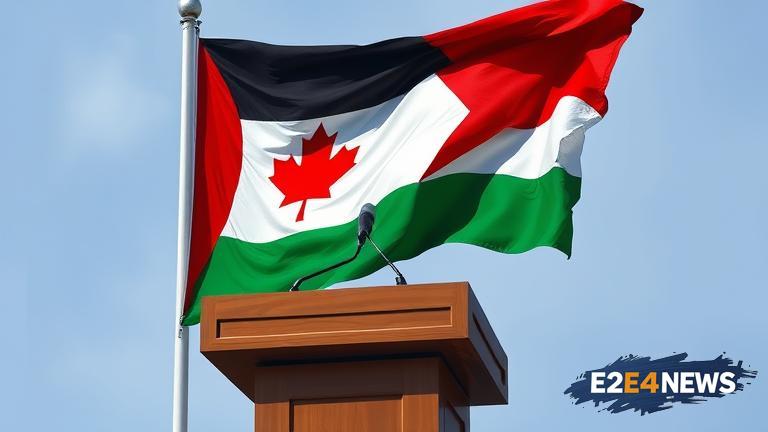In a groundbreaking move, Canada’s Prime Minister has revealed that the country will officially recognize a Palestinian state in September. This decision is expected to have far-reaching implications for the Middle East peace process and Canada’s relationships with other nations. The Prime Minister’s announcement was met with a mix of reactions, with some hailing it as a major breakthrough and others expressing concerns about the potential consequences. The recognition of a Palestinian state is a long-standing demand of the Palestinian people, who have been seeking sovereignty and self-governance for decades. Canada’s decision is seen as a significant shift in its foreign policy, as the country has traditionally been a strong supporter of Israel. The Prime Minister’s announcement was made during a speech at a major international conference, where he emphasized the need for a two-state solution to the Israeli-Palestinian conflict. He also stressed the importance of recognizing the rights and dignity of the Palestinian people. The decision is expected to be formalized in September, when the Canadian government will officially announce its recognition of a Palestinian state. This move is likely to be welcomed by the Palestinian Authority, which has been seeking international recognition for years. However, it may also face opposition from Israel, which has long been opposed to the idea of a Palestinian state. The Israeli government has argued that recognition of a Palestinian state would undermine the peace process and create instability in the region. Despite these concerns, the Canadian Prime Minister’s announcement has been hailed as a major breakthrough by many in the international community. The recognition of a Palestinian state is seen as a crucial step towards achieving a lasting peace in the Middle East. It is also expected to have significant implications for Canada’s relationships with other nations, particularly in the Arab and Muslim world. The Canadian government has emphasized that its decision is motivated by a desire to promote peace and stability in the region, rather than to take sides in the conflict. The Prime Minister’s announcement has also been welcomed by many Canadians, who see it as a reflection of the country’s values of justice, equality, and human rights. However, others have expressed concerns about the potential consequences of recognizing a Palestinian state, including the potential impact on Canada’s relationships with Israel and the United States. As the Canadian government prepares to formalize its recognition of a Palestinian state in September, it is likely to face intense scrutiny and debate both at home and abroad. The decision is expected to be closely watched by the international community, which will be looking to see how it is implemented and what impact it has on the Middle East peace process. In the coming weeks and months, the Canadian government will be working to build support for its decision, both domestically and internationally. This will involve engaging with other governments, international organizations, and civil society groups to build a coalition of support for the recognition of a Palestinian state. The Canadian government will also be working to address concerns and criticisms of its decision, including those related to the potential impact on Israel and the peace process. Overall, the recognition of a Palestinian state by Canada is a significant development that is likely to have far-reaching implications for the Middle East and beyond. It reflects a growing international consensus that the Palestinian people have the right to self-governance and sovereignty, and that a two-state solution is the best way to achieve a lasting peace in the region. As the Canadian government moves forward with its decision, it will be important to monitor the reaction of other governments and international organizations, as well as the impact on the ground in the Middle East. The recognition of a Palestinian state is a complex and sensitive issue, and it will require careful diplomacy and engagement to ensure that it is implemented in a way that promotes peace, stability, and human rights for all parties involved.
